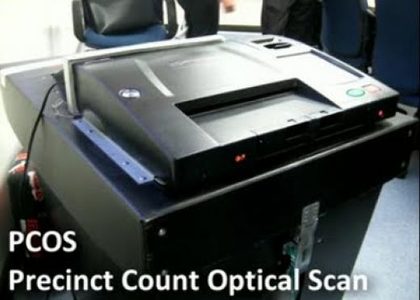SUMMARY
This is AI generated summarization, which may have errors. For context, always refer to the full article.

MANILA, Philippines – Is the P1.8-billion purchase of automated voting machines for the 2013 elections an allowed exception under the country’s procurement law?
On Wednesday, May 2, Supreme Court justices wrestled with this question during oral arguments on three petitions alleging that the Commission on Elections (Comelec) violated the law when it bought 82,000 precinct count optical scan (PCOS) machines from Smartmatic Corp. without public bidding.
Comelec exercised its option to purchase the PCOS machines on March 30, 2012 under a contract signed with Smartmatic and its local partner Total Information Management (TIM) about three years ago.
Comelec, Smartmatic and TIM signed a contract in June 2009 for the leasing of the PCOS machines during the 2010 automated elections. The contract gave Comelec an option to purchase the PCOS machines up to Dec. 31, 2010, which was extended by Smartmatic up to March 31, 2012.
The petitioners argued that that option was illegal since the contract itself expired on Dec. 31, 2010. Plus, they said the contract covered only the 2010 polls.
Petitioners Davao City Archbishop Fernando Capalla, former Marawi City Mayor Omar Solitario Ali and former Quezon City Rep. Mary Ann Susano through her lawyer Dean Abraham Espejo, said that since Comelec was purchasing PCOS machines for another set of elections, it should have conducted a bidding among possible providers.
But Associate Justice Lourdes Sereno said that what Comelec did could be considered a “repeat order,” which is one of the 5 exceptions under the Government Procurement Reform Act.
A repeat order, as defined in the law, is allowed when “the procuring entity directly procures goods from the previous winning bidder whenever there arises a need to replenish goods procured under a contract previously awarded through competitive bidding.”
Justice Presbitero Velasco, on the other hand, asked Espejo if the purchase of the PCOS machines for the 2013 elections could qualify as direct contracting, which is also an exception under the government procurement act.
Under the law, direct contracting could be done under the following conditions:
a. Procurement of goods of proprietary nature, which can be obtained only from the proprietary source, i.e. when patents, trade secrets and copyrights prohibit others from manufacturing the same item;
b. When the procurement of critical components from a specific manufacturer, supplier or distributor is a condition precedent to hold a contractor to guarantee its project performance, in accordance with the provisions of his contract; or,
c. Those sold by an exclusive dealer or manufacturer, which does not have sub-dealers selling at lower prices and for which no suitable substitute can be obtained at more advantageous terms to the government.
Velasco asked Espejo, “Is there any supplier in the world of PCOS machines in these kind?”
Espejo answered in the negative. He noted though that Comelec should still be held liable because it did not specify in its recent contract with Smartmatic that the purchase of the PCOS machines is an exception under the law.
Rappler tried to get the comment of Comelec chairman Sixto Brillantes on this matter. He did not address the question on Comelec’s transaction as a possible exception, but said that he is puzzled by the arguments of the petitioners.
Former Comelec commissioner Augusto “Gus” Lagman, however, told Rappler on the sidelines of the oral arguments that the purchase is not an exception. He said it is not allowed under the procurement act because extending the option in itself is a violation of the terms of reference of the original contract. – Rappler.com
Add a comment
How does this make you feel?
There are no comments yet. Add your comment to start the conversation.